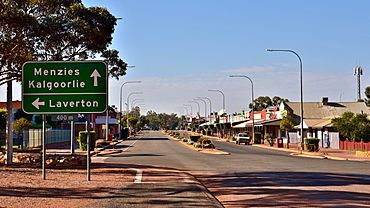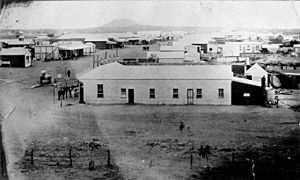Leonora, Western Australia facts for kids
Quick facts for kids LeonoraWestern Australia |
|||||||||
|---|---|---|---|---|---|---|---|---|---|

Tower Street, Leonora
|
|||||||||
| Lua error in Module:Location_map at line 416: Malformed coordinates value. | |||||||||
| Established | 1897 | ||||||||
| Postcode(s) | 6438 | ||||||||
| Elevation | 376 m (1,234 ft) | ||||||||
| Area | [convert: needs a number] | ||||||||
| Location |
|
||||||||
| LGA(s) | Shire of Leonora | ||||||||
| State electorate(s) | Kalgoorlie | ||||||||
| Federal Division(s) | O'Connor | ||||||||
|
|||||||||
Leonora is a town in Western Australia. It is located in the Goldfields-Esperance region. The town is about 833 kilometers (518 miles) northeast of Perth, the state capital. It is also 237 kilometers (147 miles) north of Kalgoorlie.
Contents
Discovering Leonora's Past
The first European explorer to visit this area was John Forrest in 1869. On June 21, 1869, Forrest and his group camped near a noticeable hill. Forrest named this hill Mount Leonora. He named it after his six-year-old niece, Frances Leonora Hardey.
In 1895, a prospector named Edward "Doodah" Sullivan found gold here. He found it at the Johannesburg lease, just north of where the town is now. Over the next two years, many valuable gold finds were made. This led to the area growing very quickly. The famous Sons of Gwalia gold mine made Leonora known around the world. By 1897, homes and businesses were built. The town was officially recognized as Leonora.
Transport and Water in Leonora
The Kalgoorlie to Leonora railway line opened in 1903. Leonora is the end point of this railway line.
From 1901 to 1921, Leonora had a special tramway. It was a single track that connected the town to nearby Gwalia. At first, the trams ran on steam. Then, from November 1908, they used electricity. After 1915, they switched to petrol power.
In October 2005, a special water treatment plant opened. It is called a reverse osmosis desalination treatment plant. This plant helps to make the town's water better. It takes water from the Station Creek wellfield. The plant removes high levels of salt and other minerals that occur naturally. It was built to provide 2.5 million liters (660,000 US gallons) of clean water every day.
Leonora's Role in Immigration
In 2010, the Australian government used a building in Leonora. It was a former mine workers' hostel. They turned it into an "Alternative Place of Detention." This was a place for asylum seekers who came from Christmas Island. An asylum seeker is someone who has left their home country and is asking for protection in another country. The government closed this facility in February 2014.
Leonora's Economy
Leonora is mainly a mining town. There are several large gold mines in the area. There is also the Murrin Murrin laterite nickel project. This project mines nickel, which is a type of metal. The area also has a big pastoral industry. This means that farming, especially raising livestock like sheep or cattle, is important here.
People of Leonora
At the 2016 census, Leonora had 556 people living there. About 27.6% of these people were of Aboriginal descent.
Leonora's Climate
The area has an arid climate. This means it is very dry. Summers are very hot, and winters are cool. Sometimes, there might be frost on winter mornings. Rainfall is very rare here.
| Climate data for Leonora | |||||||||||||
|---|---|---|---|---|---|---|---|---|---|---|---|---|---|
| Month | Jan | Feb | Mar | Apr | May | Jun | Jul | Aug | Sep | Oct | Nov | Dec | Year |
| Record high °C (°F) | 49.0 (120.2) |
46.7 (116.1) |
45.2 (113.4) |
41.7 (107.1) |
35.6 (96.1) |
30.2 (86.4) |
28.9 (84.0) |
33.0 (91.4) |
37.7 (99.9) |
40.8 (105.4) |
44.4 (111.9) |
47.8 (118.0) |
49.0 (120.2) |
| Mean daily maximum °C (°F) | 37.0 (98.6) |
35.3 (95.5) |
32.6 (90.7) |
27.9 (82.2) |
22.8 (73.0) |
19.0 (66.2) |
18.4 (65.1) |
20.7 (69.3) |
24.9 (76.8) |
28.9 (84.0) |
32.3 (90.1) |
35.3 (95.5) |
27.9 (82.2) |
| Mean daily minimum °C (°F) | 21.8 (71.2) |
20.9 (69.6) |
18.6 (65.5) |
14.8 (58.6) |
10.2 (50.4) |
7.3 (45.1) |
6.1 (43.0) |
7.0 (44.6) |
10.0 (50.0) |
13.7 (56.7) |
17.0 (62.6) |
20.0 (68.0) |
14.0 (57.2) |
| Record low °C (°F) | 12.6 (54.7) |
10.6 (51.1) |
8.4 (47.1) |
3.1 (37.6) |
0.7 (33.3) |
−2.8 (27.0) |
−1.7 (28.9) |
0.3 (32.5) |
1.8 (35.2) |
3.6 (38.5) |
4.0 (39.2) |
9.5 (49.1) |
−2.8 (27.0) |
| Average precipitation mm (inches) | 26.3 (1.04) |
31.2 (1.23) |
29.0 (1.14) |
20.4 (0.80) |
23.9 (0.94) |
25.0 (0.98) |
18.8 (0.74) |
15.9 (0.63) |
9.0 (0.35) |
9.5 (0.37) |
12.4 (0.49) |
16.8 (0.66) |
236.4 (9.31) |
| Average precipitation days | 3.4 | 3.6 | 3.9 | 3.5 | 4.3 | 5.4 | 5.2 | 3.9 | 2.6 | 2.5 | 2.9 | 3.2 | 44.4 |
| Average relative humidity (%) | 21 | 27 | 28 | 34 | 39 | 45 | 43 | 36 | 28 | 22 | 21 | 20 | 30 |
See Also
 In Spanish: Leonora (Australia Occidental) for kids
In Spanish: Leonora (Australia Occidental) for kids
 | Bessie Coleman |
 | Spann Watson |
 | Jill E. Brown |
 | Sherman W. White |


